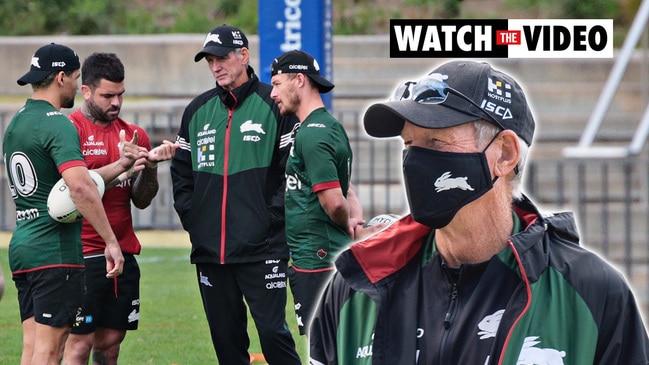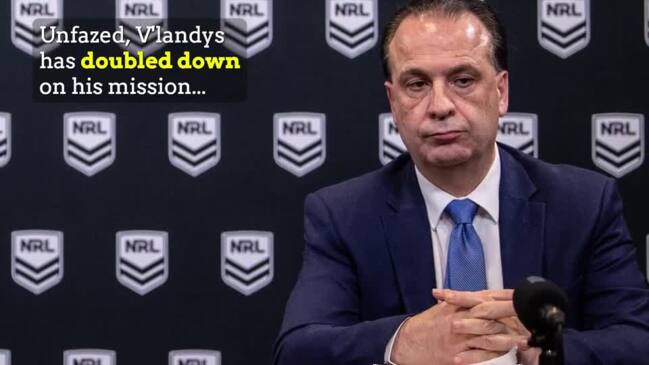Footy must crack down on covidiots
NRL boss Peter V’landys was rightly lauded for his single-mindedness in pushing for a restart of the NRL season. But Mr V’landys – and Queensland Premier Annastacia Palaszczuk – now have a problem, with the competition’s “biosecurity bubble” about as porous as the Brisbane Broncos’ defence, writes the Editor.
Opinion
Don't miss out on the headlines from Opinion. Followed categories will be added to My News.
NRL boss Peter V’landys was rightly lauded for his single-mindedness in pushing for a restart of the NRL season after the competition was forced to shut down in March.
V’landys refused to accept the season would be a write-off. He brought in a biosecurity expert, Associate Professor David Heslop, intensely lobbied state governments and was agile enough in his thinking to ride out COVID outbreaks in NSW and Victoria, as well as a closed border with New Zealand.
Perhaps his greatest achievement in this time was to secure Queensland travel exemptions from Annastacia Palaszczuk, despite the Premier’s risk-averse nature when it comes to COVID-19.

But Mr V’landys and Ms Palaszczuk now have a problem. Because it seems the competition’s “biosecurity bubble” is about as porous as the Brisbane Broncos’ defence. In just the last few days we have seen:
RABBITOHScoach Wayne Bennett caught dining with his partner at a Sydney restaurant. He claimed he didn’t know it was a breach of the biosecurity rules.
BRONCOS legend Allan Langer and two other members of Brisbane coaching staff spotted drinking at the Caxton Hotel.
BRISBANE forward Tevita Pangai Jr found at a Gold Coast barber shop, which unfortunately for Pangai was raided by cops as he waited for a haircut.
The NRL must be praised for taking swift action in these cases. Bennett was fined $20,000 and suspended for two weeks, Langer and his drinking buddies copped $5000 fines and were forced to sit out Friday night’s match, and Pangai Jr will now miss two weeks. He’ll also cop a fine.

But the worrying thing is that these are not isolated incidents. There have been plenty of others, as outlined in today’s Courier-Mail The Victorian AFL teams, safe inside the Queensland bubble, have not been blameless either.
All of this, of course, erodes public confidence in the NRL’s protocols and their ability to keep the public safe, and the game free from COVID-19.
When Bennett was asked about his COVID breach, he replied: “I go shopping, I go out to get meals. There wasn’t many there at all. I was isolated, away from everybody, just had lunch.”
So no big deal then? Except of course it is. NRL players and support staff are one of the few sections of society who can regularly cross the NSW-Queensland border. And despite constant testing, there is a very real chance someone could bring the virus back after an away game.
What happens next would be brutal. An outbreak inside the bubble would be bad enough and could end the season, but an outbreak outside the bubble would cause enormous antipathy towards the game that so many Queenslanders love.
No one wants to see the Queensland government pull the rug from under the NRL. And it shouldn’t come to that.
But Health Minister Steven Miles and Chief Health Officer Jeannette Young would have every right to be furious.
V’landys has come down hard on transgressors. He needs to make sure everyone in the game is in no doubt about the consequences of any further biosecurity breaches.
PRICING NOT GOING TO SCRIPT
CHEMISTS are among the most trusted and respected members of our society, but that goodwill is in jeopardy if pricing practices revealed today in The Courier-Mail are allowed to continue.
As part of our Bad Medicine special investigation, it has been revealed that a new agreement between the Pharmacy Guild of Australia and the federal government is actually driving up the price of some prescriptions.
Under the agreement, chemists are allowed to add five separate fees to the cost of a $1.20 drug, driving the price up to more than $20.
It means consumers are not able to take advantage of the recent drop in price of many drugs, as their patents lapse.
Consumers can get around the mark-ups by shopping at discount pharmacies or online, but that option might not be available to everybody. Monopoly rules in rural areas mean discount outlets are often unable to open.
The federal government needs to act to put the consumer first.
